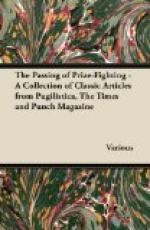But we soon began to regret the absence of sustenance, for this kind of weather makes for extreme lassitude shot through with rattiness, and under its influence nourishment dies in one with painful celerity.
The blessed word “inn” was however on the ordnance map, and since it was the one-inch scale that cannot lie we braced ourselves, mended and remended our tempers, and plodded on. The dales no doubt are gorgeous places, but under this grey humid sky anyone who wanted it could have had my share of Billsdale (as I believe it was). Scenery had become an outrage. There was no joy, no beauty; nothing was worth living for but that inn. As we laboured forward we cheered each other by word-pictures of its parlour, its larder and its cellar. A pork-pie ("porch-peen” I fancy the Yorkshiremen call it) would probably be there. Eggs, of course. A ham, surely. Bacon, no doubt. Yellow butter, crusty new bread, and beer. Indeed, let the rest go, so long as there was beer. But beer, of course, was beyond any question; an inn without beer was unthinkable.
Thus the miles wore away until, footsore, sticky and faint, we came upon the hostelry itself—only to find, instead of any grateful sign and the promise of delight, the frigid words, “Friends’ Meeting House,” painted on the board....
That was one experience, over which a veil may well be drawn. The other was not so long ago, in Sussex, a little before the War. This time we had not walked, but had done that much more hungrifying thing—we had been for hours in a motor-car, exceedingly engaged on the task of looking at houses to let. At last, utterly worn out, in the way that motoring can wear out body, soul and nerves, and filled with a ravening desire to tear meat limb from limb, we came to an inn of which our host had the highest opinion—so high, indeed, that, empty though we were, he had forced the car at full-speed past at least half-a-dozen admirable but less pretentious houses, where I, in my small way, had more than once been nourished and sustained.
When, however, at last we did arrive at his desired haven, late in the afternoon, when dusk was beginning to fall and blur with her gentle hand the sharp lines of hill and tree, we acknowledged his wisdom, for in the window beside the door, where we creakingly but joyfully alighted, were visible, although no longer distinctly, a vast ham as yet uncut and two richly-browned cold fowls. “There,” said he, with a pardonable triumph, “didn’t I tell you?” and so, our lips trembling with the anticipation of nutriment, we entered, flung off our wraps, and prepared, on the evidence, for such bliss as earth too rarely affords. But alas for hopes raised only to be shattered, for the host had nothing to offer us but bread and cheese. The ham and chickens were of papier-mache.




